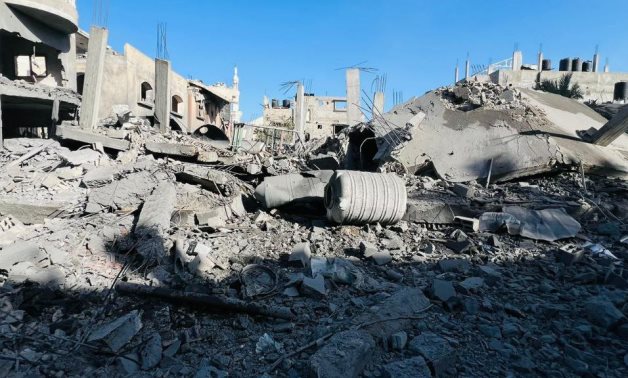
Bombing a house for the Hanif family near Al-Istiqama Mosque in Rafah- photo from Palestinian journalists in Gaza
CAIRO – 25 May 2024: The International Court of Justice (ICJ) ordered Israel to immediately halt its military operation in Rafah, in response to an urgent request by South Africa. So, what does this ruling means?
The court, which voted by 13 votes in favor to 2 votes against, imposed additional measures on Israel, demanding that it immediately stop its attack against the Palestinian people. The ICJ ruling mandates Israel to open the Rafah crossing between Egypt and Gaza to facilitate the delivery of aid. It described the humanitarian situation in the city of Rafah as “catastrophic” and ordered Israel opens the crossings and passes humanitarian aid urgently.
The ICJ is the highest UN judicial body that considers disputes between countries. Although the court’s provisions are final and binding, they were ignored in the past, especially since the court does not have executive powers. However, the UN Security Council has the authority to implement these measures.
This month, Israel launched its attack on the southern city of Rafah, forcing hundreds of thousands to flee the city, which has become a refuge for about half of its population of 2.3 people. Meanwhile, the Israeli occupation forces continue to close the Rafah and Karam Abu Salem border crossings.
January 2024, the court ordered Israel to prevent genocidal acts in Gaza. However, Israel has repeatedly rejected accusations of genocide in the case, describing them as baseless, and argued before the court that its operations in Gaza were self-defense and targeted fighters Hamas who attacked Israel on October 7.
However, Israel will continue ignoring judicial decisions and keep its military operations in Rafah and Gaza as a whole. The best evidence of that is when the Israeli occupation aircraft launched violent raids on the Palestinian city of Rafah, especially in the middle of the Shaboura camp in Rafah, shortly after the issuance of the International Court of Justice’s court.
Comments
Leave a Comment